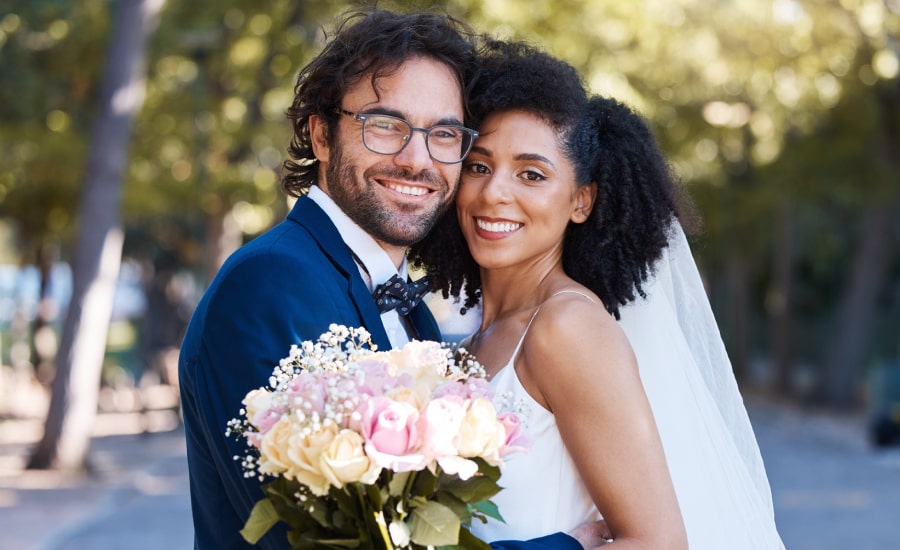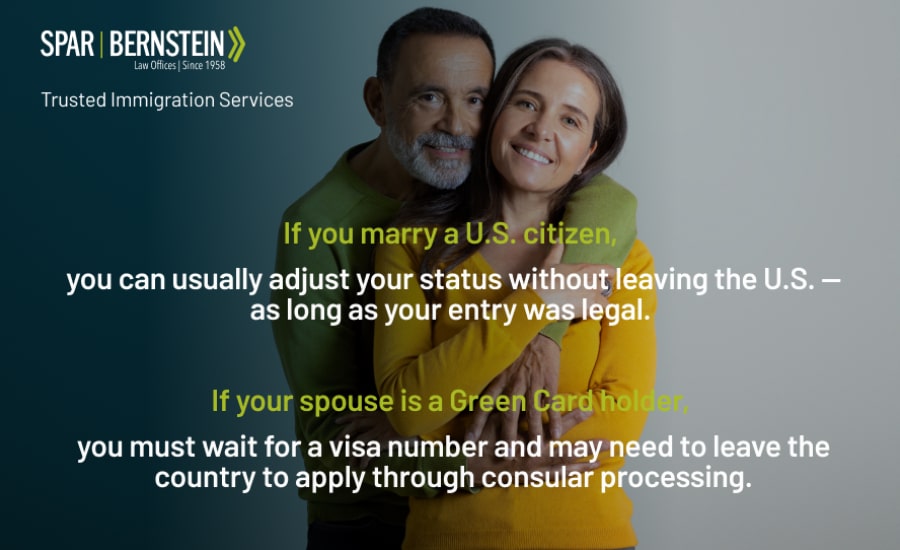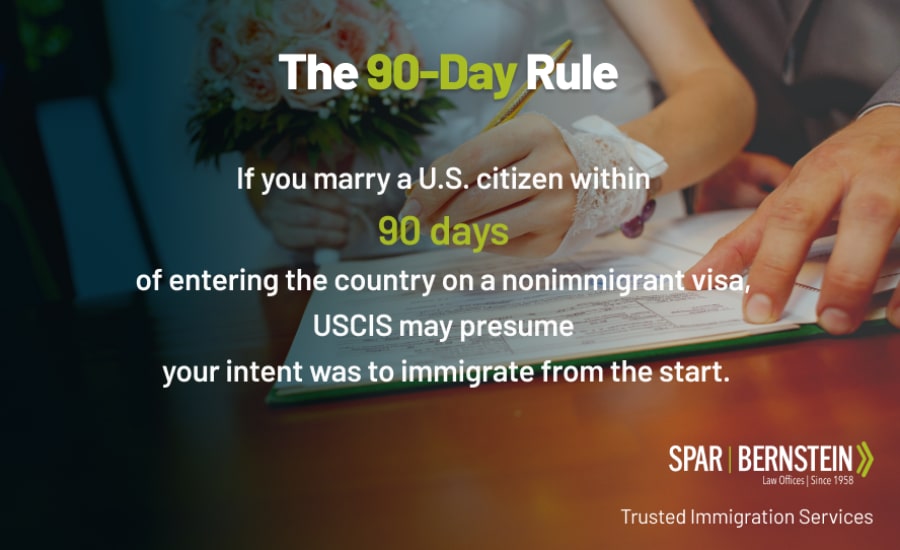

What Happens If You Get Married While On A Tourist Visa? Key Points
- It’s legal to get married on a tourist visa in the United States, but your original intent at the time of entry plays a crucial role in determining your immigration options
- You may be eligible to apply for a Green Card through adjustment of status if you entered lawfully, your marriage is genuine, and you meet other eligibility requirements
- If you’re ineligible to adjust your status in the U.S., you may have to leave the country and complete the immigration process through consular processing.
- A K-1 fiancé visa may be a better option if you plan to marry a U.S. citizen and want to avoid complications related to a nonimmigrant visa
- Working with an experienced immigration lawyer can help you understand your options, increasing the chances to remain in the U.S. legally
If you’re visiting the United States on a tourist visa and end up falling in love, you may find yourself asking: What happens if I get married while on a tourist visa?
In this guide, we’ll share:
- What to do after marrying while visiting on a tourist visa
- Legal implications and potential challenges that can result from a marriage while in the U.S. on a tourist visa
- Answers to frequently asked questions
Challenges Of Getting Married While On A Tourist Visa
Marrying while on a tourist visa can feel like the beginning of a life together, but it often brings immigration challenges.
Suspicion Of Visa Fraud Or Misrepresentation
A nonimmigrant visa, such as a tourist visa, does not allow you to remain in the U.S. permanently.
Known as a B-2 visa, a tourist visa is typically used to enter the U.S. for a vacation, visiting family and relatives, tourism purposes, participation in social or amateur events or medical treatment.
Depending on the circumstances of your case, the potential punishments for visa fraud include:
- Fines
- Imprisonment
- Deportation
- Inadmissibility to the U.S.
To eliminate the risk of being suspected of visa fraud when getting married while on a tourist visa in the U.S., you must prove that:
- You entered the U.S. with visitor intentions.
- You entered the marriage in good faith and not for the purpose of obtaining a Green Card.
- Your marriage took place a considerable amount of time after your entry into the country.
Inability To Be Legally Employed
If you marry a U.S. citizen while on a tourist visa and apply for adjustment of status, you’ll likely have to wait several months before receiving work authorization (Form I-765).
Until that document is approved and issued, you cannot legally work in the United States, which can lead to financial and emotional stress or temptation to work “under the table”, which is risky and can harm your immigration case.
To stay on the safe side when considering marriage while on a tourist visa in the U.S., talk to an experienced immigration lawyer.
They will explain your options and advise you of the next steps so you can stay close to your loved ones.
Adjustment Of Status: Can You Remain In The US After Marrying While On A Tourist Visa?
If you marry a U.S. citizen while on a valid tourist visa and wish to remain in the country, you may be eligible to apply for a Green Card through adjustment of status by filing Form I-485, Application to Register Permanent Residence or Adjust Status.
This will allow you to become a lawful permanent resident (obtain a Green Card) without returning to your home country, as long as:
- Your marriage is genuine and not solely for immigration benefits.
- You were inspected and admitted or paroled into the U.S.
- You are otherwise eligible for adjustment of status.
To apply for an adjustment of status, you need to:
- Submit the necessary forms, along with supporting documents
- Pay the fees
- Attend a marriage interview
- Undergo background checks
Your adjustment of status application will either be approved or denied.
- If approved, you will be granted lawful permanent residency in the U.S. and receive a Green Card (read more about its benefits here) to legally live and work in the U.S.
- If denied, you will need to depart the country or appeal the decision and explore other immigration options. The denial of your application may be based on various grounds, including suspicion of a fraudulent marriage, a criminal record, prior immigration sanctions, or poor health status.
If you marry a U.S. citizen, a visa number will be immediately available for you.
If you marry a lawful permanent resident, you will have to wait until a visa number becomes available, as there is an annual quota for this category. This means:
- If a visa number is available before your visa expires, you can stay in the U.S. and apply for an adjustment of status by filing Form I-130.
- If there is no visa number available before your visa expires, you will need to return to your home country and follow the consular processing pathway to obtain your Green Card. However, there might be options to change your nonimmigrant status and obtain a different type of temporary visa. Contact an knowledgeable immigration attorney to receive professional advice on your next steps.
Applying for a Green Card from your home country, or consular processing, may take longer compared to the adjustment of status process.
Although consular processing is similar to the adjustment of status process, there are some differences in the process and the documents required.

What Happens If You Get Married While On A Tourist Visa?
Getting married while on a tourist visa in the U.S. can cause complex immigration issues but it doesn’t automatically mean trouble.
What happens next depends on:
- Your intent when you entered the country
- How soon you marry after you enter the country
- The steps you take afterward
Your Intent
If you arrived in the U.S. on a B-2 tourist visa planning to return home after your visit — and you decided to marry after your arrival — you may be able to apply to adjust your status without leaving the country.
However, if you applied for a tourist visa with the intention to marry and remain in the U.S., this can be considered visa fraud due to a misrepresentation of the real reasons for your visa application and travel to the U.S.
In this case, you can face serious consequences such as denial of your adjustment of status or even removal proceedings.
The 90-Day Rule
The U.S. Citizenship and Immigration Services (USCIS) often apply what’s known as the 90-day rule.
This means if you marry a U.S. citizen and apply for a Green Card within 90 days of entering the U.S. on a tourist visa, USCIS may presume that you misrepresented your true intentions at the time of entry.

The Alternative: How To Marry A US Citizen In The US, While On A Visa
If you are a foreign national considering marriage to a U.S. citizen and have not yet applied for a visa, you may want to consider a fiancé visa.
You can apply for a fiancé visa, also known as K-1 visa if you are engaged to a U.S. citizen and plan to marry no later than 90 days after entering the U.S.
After the marriage takes place, you need to apply for an adjustment of status.
You cannot apply for a K-1 visa if your fiancé is a lawful permanent resident — this option is only valid for U.S. citizens.
Although it typically takes more time and is a more complex process than a tourist visa application, a K-1 visa will give you peace of mind, as you will not have to worry about being suspected of visa fraud.
A K-1 visa is an adequate solution if you want to travel and marry within the U.S.
If you marry outside the U.S., you can then apply for a marriage-based visa to be able to join your spouse in the U.S.
What’s the difference between a fiancé visa and a marriage-based visa?
- The location where the marriage takes place: A K-1 visa allows you to marry inside the U.S. while a spouse visa is used to enter the U.S. after the marriage takes place in another country
- The applicants: Only a fiancé of a U.S. citizen is permitted to petition for a K-1 visa, while a spouse visa is available to spouses of both U.S. citizens and lawful permanent residents
Other differences between a K-1 visa and a spouse visa include requirements, cost, application process, and processing time.
Find out more insights about fiancé visas vs. spouse visas.
What Happens If You Get Married While On A Tourist Visa? Key Takeaways
- Coming to the U.S. on a tourist visa and marrying within 90 days can trigger scrutiny from USCIS under the 90-day rule.
- If eligible, you can file for adjustment of status without leaving the U.S. if your entry was legal and your marriage is real.
- If you’re married to a lawful permanent resident or ineligible to adjust status in the U.S., you may need to go back to your country and go through consular processing.
- An experienced immigration attorney can help assess your case, prepare your forms, and represent you before USCIS or the consulate.
- Consider a K-1 visa if your goal is to marry a U.S. citizen and stay in the country legally without facing immigration risks.
Need Help With Your Marriage While On A Visa? Contact Spar & Bernstein
Founded in 1958, with a focus on helping clients in all spheres of immigration law, The Law Offices of Spar & Bernstein represent clients worldwide and in all 50 states.
With a rich portfolio of successful stories, our knowledgeable team at Spar & Bernstein is dedicated to offering comprehensive legal services to help our clients navigate the complex immigration process.
If you’re married while on a tourist visa and need to adjust your status, our experienced team will help you in the process, taking care of the accurate and timely submission of required documentation.
If you need to apply for a Green Card through consular processing, we’ll help you with the requirements at the U.S. Consulate or Embassy in your home country by gathering and submitting documentation and preparing you for your consular interview.
If you are considering a fiancé visa to join and marry your loved one in the U.S., we’ll support you by preparing and filing your petition, making sure your application meets the K-1 visa requirements. We will then help you apply for a Green Card, standing by your side every step of the way.
Providing personalized guidance and compassionate advocacy, our tenacious immigration lawyers will fight for the success of your immigration journey.
Getting Married While On A Tourist Visa: FAQ’s
If you still have questions about your stay in the U.S. after getting married while on a tourist visa, check out our FAQs below.
Can you get married while on a tourist visa?
While there are no laws prohibiting marriage when visiting on a tourist visa, you could face severe consequences if your intentions for entering the U.S. were not true.
Does getting married while on a tourist visa mean that I am guaranteed a Green Card?
Getting married while on a tourist visa does not automatically guarantee a Green Card. To become a lawful permanent resident, you must take additional steps, such as applying for an adjustment of status or getting a different type of visa.
What happens if my tourist visa expires before the wedding?
If your tourist visa expires before the wedding, contact our knowledgeable and compassionate immigration team at Spar & Bernstein to discuss legal options for extending your stay.
What happens if I overstay my authorized period of stay after getting married while on a tourist visa?
Overstaying your authorized period of stay, also referred to as overstaying a visa, is treated as a violation of immigration laws. Serious consequences may ensue, such as removal proceedings or a temporary ban from reentering the U.S.
Can I extend my stay while on a tourist visa?
You may be able to extend your stay while on a tourist visa by six months to prevent falling out of status. Contact our experienced attorneys at Spar & Bernstein to discuss your options.
Can I work in the U.S. if I get married while on a tourist visa?
If you get married while on a tourist visa, you are not able to legally work in the U.S. Engaging in any form of employment without obtaining employment authorization is considered a violation of your visa terms.





